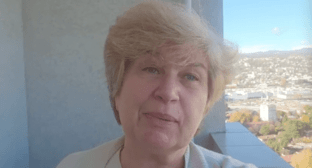10 January 2004, 16:39
The Former Political Prisoners for Human Rights on human rights situation in Georgia
We call your attention to the statement by The Former Political Prisoners for Human Rights NGO. Its authors raise concern about the human rights situation in Georgia after the so called velvet revolution.
One Month after the Revolution
The most important things for us are the protection of values recognized by the international norms and Georgian legislation, creation of good conditions for the protection of human rights and struggle against the violation of such rights, despite the fact who governs Georgia.
The new government started to govern the country with revolutionary spirit and offered good slogans to the society. The nearest future will show how possible the real implementation of the government promises is. Frankly, there are grounds for serious doubts regarding the minimization and elimination of taxes and promises to double and increase salaries and pensions (without identifying concrete time terms). Regarding the measures taken after the revolution, we should say the following:
1. We support all real (not for propaganda) measures taken against corruption, smuggling, drug dealings, hidden taxes and other forms of crime only if the government does not use double standards and does not hide crimes revealed among its members and among its active supporters.
2. Now the real reason of our concern is the environment that creates a good basis for human rights violations by the government and its activists. Freedom of speech and independence of judiciary is under threat, when they were able to keep impartiality during the period of Shevardnadze's government. Unfortunately, there are facts of threatening journalists and political opponents for the purpose of frightening and blackmailing them (armed attacks on the houses of journalists Lyuba Eliashvili, Irina Sarishvili, David Anjaparidze, the head of "Revival", an explosion in front of the Labor Party office, an attack on the Revival Party office, threats and blackmail against old members of the Central Election Commission and Georgian Parliament, threats against The First Channel, TV Company Caucasus and Mze). The Supreme Court of Georgia has made several political decisions regarding election cases after November 23 (for instance, the Supreme Court of Georgia has interfered in the competence of the Constitutional Court of Georgia and abolished the final results of the November 2 elections). We do not accept the use of such forms and methods, just the same way as we do not accept the similar methods of governing that have been used on the territory of the Ajarian Autonomous Republic for several years. We think that international representations and organizations should express their unified negative position regarding the facts of human rights violations, regardless of the fact by which government they are committed.
3. The legislative and administrative changes regarding the elections that have been implemented by the scared and totally depended Parliament of Georgia and Central Election Commission are a matter of deep concern. The new mechanism of registration of voters was created in the total outlawry of the Georgian Constitution and Georgian legislation. This procedure deprives a citizen who has not registered himself and has not shown up at the elections of voter status. These changes do more that just limit the competitive political environment but question the legitimacy of the elections. This is very strange because the candidate nominated by the government for the President of Georgia has a guarantee of the support of the majority and his active supporters may give him bad service by such behavior.
The issue of concern is the behavior of law-enforcement agencies, which is a new way of implementation of the most shameful traditions of the police. We mean the arrest of people by stealthily putting drugs or guns into their pockets and later "working" with the arrested prisoners with the purpose of the investigation of actual suspicions toward those people. The good examples of this are measures taken against the so-called supporters of Igor Giorgadze. Several days before their arrest, a high-rank official disseminated information on possible "armed attacks". The "measures" taken against Giorgi Inasaridze, who was arrested on December 19 and was found hanged in his cell in the morning of December 20, were of a similar character. We should mention that the facts of jumping (or throwing) from windows of police departments or the cases of suicide were eliminated during the last year. The fact of Giorgi Inasaridze's suicide (or killing) is the only one during the year of 2003, and, unfortunately, it took place during the rule of the new government. This is a dangerous symptom because if the previous heads of law enforcement agencies were forced to pay attention to the actions of media, international organizations and human rights NGOs, the new government feels total loyalty from the majority of the above mentioned institutions, which can cause total neglect of the self limitation and protection of internationally recognized human rights. Based on this, we think that the statements made by representatives of the government according to which they only verbally disagree and object to forced measures, threats, blackmail against the opposition are not enough and are formal implementation of duties. The government should prove these statements by activities and should punish the authors of such behavior because the government is responsible for everything in the country. Otherwise there will be grounds for thinking that the atmosphere of threats created by the government is a reason for the forced measures taken against political opponents. This is equally addressed to the central as well as regional governments (in particular, the Adjarian one, with its rich, long experience of human rights violations).
Finally, we, as the initiators of the referendum taken on November 2, think that we should remind the following to the society: This government with the purpose of and motivated by the protection of people's will and their votes initiated the revolution in November and now they should take into consideration the public will expressed by almost 2 million voters in the referendum. Almost 90% of the voters openly requested to elect 150 MPs in the next parliamentary election instead of 235. This can become a test for the new government. This test will reveal whether they take into consideration the wish of people or not. The results of the referendum are not abolished and it has the power of the law. We think that after the presidential elections, the most important issue for the Parliament should be relevant changes and amendments to the Constitution of Georgia, which will determine that the Parliament of Georgia consists of 150 members (the only issue for discussion can be time frames of enforcement of this norm).
The issue of our concern is that many human rights NGOs and their representatives, who struggled against the violations of human rights under the previous government, are observing the above-mentioned facts without any reaction and supporting the development of negative tendencies by such behavior. It will be very unfortunate if they considered the function of human rights protection as a means of struggle against the old government. We would like to believe that this is the inertia of revolutionary excitement and soon they will get back to their functions - those functions that an objective and neutral NGO has under any government.
The Former Political Prisoners for Human Rights NGO
Source: Emil Adelkhanov




